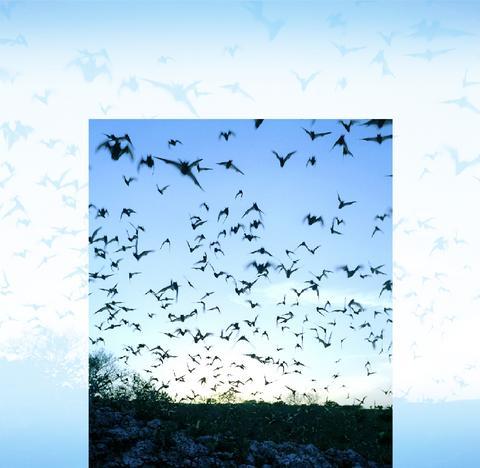The creator of a video work offering, among other things, a slice of life in US President George W. Bush's favorite diner in Crawford, Texas, is the winner of this year's Turner Prize, Britain's most prestigious award for contemporary art, organizers announced Monday night in London.
The video, Memory Bucket: A Film About Texas, is part of an installation by 38-year-old Jeremy Deller, who has traversed many mediums -- from photography to film to brass-band concerts -- to explore history, memory and political change in Britain.

PHOTO: NY TIMES
Memory Bucket, which documents Deller's recent travels through Texas, focuses on two politically charged locations: the site of the Branch Davidian siege in Waco and Bush's hometown of Crawford. Deller is best known for The Battle of Orgreave, a film he created with the director Mike Figgis that recreated clashes between the police and picketers during Britain's 1984 miner's strike.
As in past years, the work of the four Turner Prize finalists is on display at Tate Britain, where the award was announced at a ceremonial dinner broadcast on national television.
Because the works on the Turner Prize short list are often highly conceptual, even mystifying, to the average viewer, the award is notorious for its ability to generate debate. The London-born Deller has admitted over the years that he can neither draw nor paint and that his teachers advised him against going to art school. Yet he ignored them and trained as an art historian at the Courtauld Institute.
Deller is popular among his contemporaries, however, and London's clubby contemporary-art world had predicted for weeks that he would take the prize. Still, not all critics have lavished praise on his work. Richard Dormant, the art critic for The Daily Telegraph, wrote, "What bothers me is that Deller never saw a cliche he didn't like and never had a political opinion he couldn't fit on a billboard."
The submissions of this year's finalists had heavy political overtones. Ben Langlands and Nickki Bell created a digital model of a deserted crumbling bunker called The House of Osama bin Laden, which visitors could tour by video screen. Kutlug Ataman, a Turkish native who has lived in London, screened simultaneous filmed interviews with Turks who say they have been reincarnated and an investigation of a horticulturist's obsession.
The Anglo-Nigerian artist Yinka Shonibare presented a 30-minute exotic film version of Verdi's opera Ballo in Maschera without music or words, and a three-dimensional installation of a headless courtesan.
The winner of the award receives almost US$50,000 and the finalists nearly US$10,000 each. Intended to promote new discussion of contemporary art, the Turner Prize must officially go to a British artist under 50 and has been something of a lightning rod since its inception 20 years ago. Critics in 1984 faulted the first choice, the painter Malcolm Morley, who was born in London but had not lived there for more than 25 years and, they argued.
Other artists have met with far harsher criticism, like Damien Hirst, who won in 1995 for Mother and Child, a dissected cow and calf submerged in formaldehyde, and Chris Ofili, who won in 1998 for paintings adorned with elephant dung.
For art connoisseurs puzzling over what Deller's videos are all about, the museum catalogue helpfully informs them that the artist is "part-alchemist, part social-anthropologist who is often concerned with recontextualising the recent past to reveal hidden histories that deviate from a prevailing view."

One of the biggest sore spots in Taiwan’s historical friendship with the US came in 1979 when US president Jimmy Carter broke off formal diplomatic relations with Taiwan’s Republic of China (ROC) government so that the US could establish relations with the People’s Republic of China (PRC). Taiwan’s derecognition came purely at China’s insistence, and the US took the deal. Retired American diplomat John Tkacik, who for almost decade surrounding that schism, from 1974 to 1982, worked in embassies in Taipei and Beijing and at the Taiwan Desk in Washington DC, recently argued in the Taipei Times that “President Carter’s derecognition

This year will go down in the history books. Taiwan faces enormous turmoil and uncertainty in the coming months. Which political parties are in a good position to handle big changes? All of the main parties are beset with challenges. Taking stock, this column examined the Taiwan People’s Party (TPP) (“Huang Kuo-chang’s choking the life out of the TPP,” May 28, page 12), the Democratic Progressive Party (DPP) (“Challenges amid choppy waters for the DPP,” June 14, page 12) and the Chinese Nationalist Party (KMT) (“KMT struggles to seize opportunities as ‘interesting times’ loom,” June 20, page 11). Times like these can

June 23 to June 29 After capturing the walled city of Hsinchu on June 22, 1895, the Japanese hoped to quickly push south and seize control of Taiwan’s entire west coast — but their advance was stalled for more than a month. Not only did local Hakka fighters continue to cause them headaches, resistance forces even attempted to retake the city three times. “We had planned to occupy Anping (Tainan) and Takao (Kaohsiung) as soon as possible, but ever since we took Hsinchu, nearby bandits proclaiming to be ‘righteous people’ (義民) have been destroying train tracks and electrical cables, and gathering in villages

Dr. Y. Tony Yang, Associate Dean of Health Policy and Population Science at George Washington University, argued last week in a piece for the Taipei Times about former president Ma Ying-jeou (馬英九) leading a student delegation to the People’s Republic of China (PRC) that, “The real question is not whether Ma’s visit helps or hurts Taiwan — it is why Taiwan lacks a sophisticated, multi-track approach to one of the most complex geopolitical relationships in the world” (“Ma’s Visit, DPP’s Blind Spot,” June 18, page 8). Yang contends that the Democratic Progressive Party (DPP) has a blind spot: “By treating any